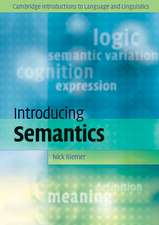Language Evolution: Contact, Competition and Change
Autor Salikoko S. Mufweneen Limba Engleză Hardback – 30 mar 2008
This book examines the processes by which languages change, from the macroecological perspective of competition and natural selection. In a series of chapters, Salikoko Mufwene examines such themes as:
- natural selection in language
- the actuation question and the invisible hand that drives evolution
- multilingualism and language contact
- language birth and language death
- the emergence of Creoles and Pidgins
- the varying impacts of colonization and globalization on language vitality
This comprehensive examination of the organic evolution of language will be essential reading for graduate and senior undergraduate students, and for researchers on the social dynamics of language variation and change, language vitality and death, and even the origins of linguistic diversity.
Preț: 1069.16 lei
Preț vechi: 1243.21 lei
-14% Nou
Puncte Express: 1604
Preț estimativ în valută:
204.61€ • 222.17$ • 171.87£
204.61€ • 222.17$ • 171.87£
Carte tipărită la comandă
Livrare economică 22 aprilie-06 mai
Preluare comenzi: 021 569.72.76
Specificații
ISBN-13: 9780826493699
ISBN-10: 0826493696
Pagini: 376
Dimensiuni: 156 x 234 x 22 mm
Greutate: 0.69 kg
Ediția:New.
Editura: Bloomsbury Publishing
Colecția Continuum
Locul publicării:London, United Kingdom
ISBN-10: 0826493696
Pagini: 376
Dimensiuni: 156 x 234 x 22 mm
Greutate: 0.69 kg
Ediția:New.
Editura: Bloomsbury Publishing
Colecția Continuum
Locul publicării:London, United Kingdom
Caracteristici
Provides a comprehensive and readable survey of Language Evolution from an often controversial but widely respected, key name in the field.
Cuprins
1. Introduction
I: Population Dynamics and Language Evolution
2. Language evolution: The population genetics way
3. Population movements, contacts, competition, selection, and language evolution
4. How population-wide patterns emerge in language evolution: A comparison with highway traffic
5. What do creoles and pidgins tell us about the evolution of language?
6. Race, racialism, and the study of language evolution in America
II: Competition, Selection, And the Development of Creoles
7. Competition and selection in language evolution
8. Transfer and the substrate hypothesis in creolistics
9. Grammaticization and the development of creoles
10. Multilingualism in linguistic history
III: Globalization And Language Vitality
11. Language birth and death
12. Globalization and the myth of killer languages: What's really going on?
13. Myths of globalization: What African demolinguistics reveals
14. A Case Study: The ecology of Gullah's survival
Conclusions
I: Population Dynamics and Language Evolution
2. Language evolution: The population genetics way
3. Population movements, contacts, competition, selection, and language evolution
4. How population-wide patterns emerge in language evolution: A comparison with highway traffic
5. What do creoles and pidgins tell us about the evolution of language?
6. Race, racialism, and the study of language evolution in America
II: Competition, Selection, And the Development of Creoles
7. Competition and selection in language evolution
8. Transfer and the substrate hypothesis in creolistics
9. Grammaticization and the development of creoles
10. Multilingualism in linguistic history
III: Globalization And Language Vitality
11. Language birth and death
12. Globalization and the myth of killer languages: What's really going on?
13. Myths of globalization: What African demolinguistics reveals
14. A Case Study: The ecology of Gullah's survival
Conclusions
Bibliography
Index
Recenzii
'Inspired by evolutionary biology, Salikoko Mufwene's spectacularly comprehensive and thought-provoking new book goes for the big picture and illuminates fundamental principles of language evolution and language contact. Showcasing the peculiar (or not so peculiar, after all) evolutionary conditions of creoles, Mufwene reaches novel and unorthodox insights which build upon concepts such as the importance of ecology, competition and selection, imperfect replication, and family resemblance. He questions and retunes some fundamental notions in linguistics like "system", "transmission" or "acquisition", thus coming considerably closer to an understanding of how language has evolved than earlier linguistic theory. Ingenious imagery like the highway traffic analogy show how patterns have emerged through "invisible hand" evolution, the convergence of communal behavior, and how imperfection, far from being imperfect, generates real-life structures. Principles like the ubiquity of contact and hybridism, the understanding of languages as species and complex adaptive systems, the relationship between mutual accommodation between individuals and emergent communal behavior, or the link between globalization and indigenization invoke a new down-to-earth linguistics in which the interactions of real-life individuals are at the core of far-reaching developments. A must-read for theorists of language change and language contact, and for anybody interested in how language really works.' Professor Edgar W. Schneider, Chair of English Linguistics, University of Regensburg, Germany
"This is one of the most important books I have read in the past 10 years. Reading this work is like reorienting oneself to the field anew. It is necessary reading in creole studies and general linguistics."The Journal of Language in Society, 2010
"The scope of this undertaking is ambitious and the result is an opportunity for scholars of comparative literature to consider new types of literary and cultural constellations encompassing national, translational and global movements."The Comparatist
Briefly reviewed in the Year's work in English Studies journal, vol 89, No. 1
"...an interesting reading to anyone working in sociolinguistics and language contact...this is a fascinating book, challenging much received wisdom and packed with innovative analysis of some traditional linguistic issues. It is a must-read especially for those interested in the study of creoles and language contact." - Susan Lixia Cheng, The Linguist List, September 29, 2008
"There are also some shortcoming which would have been remedied through rigorous editing, such as the typographical mistake of the word "sztrong" (p. 123). The use of acronyms for some terminologies is also chaotic: the abbreviations don't appear at the first mention of the terms and even when they have been given, in the following part of the book the terns are written out in fill again." - Susan Lixia Cheng, The Linguist List, September 29, 2008
"This is one of the most important books I have read in the past 10 years. Reading this work is like reorienting oneself to the field anew. It is necessary reading in creole studies and general linguistics."The Journal of Language in Society, 2010
"The scope of this undertaking is ambitious and the result is an opportunity for scholars of comparative literature to consider new types of literary and cultural constellations encompassing national, translational and global movements."The Comparatist
Briefly reviewed in the Year's work in English Studies journal, vol 89, No. 1
"...an interesting reading to anyone working in sociolinguistics and language contact...this is a fascinating book, challenging much received wisdom and packed with innovative analysis of some traditional linguistic issues. It is a must-read especially for those interested in the study of creoles and language contact." - Susan Lixia Cheng, The Linguist List, September 29, 2008
"There are also some shortcoming which would have been remedied through rigorous editing, such as the typographical mistake of the word "sztrong" (p. 123). The use of acronyms for some terminologies is also chaotic: the abbreviations don't appear at the first mention of the terms and even when they have been given, in the following part of the book the terns are written out in fill again." - Susan Lixia Cheng, The Linguist List, September 29, 2008


















